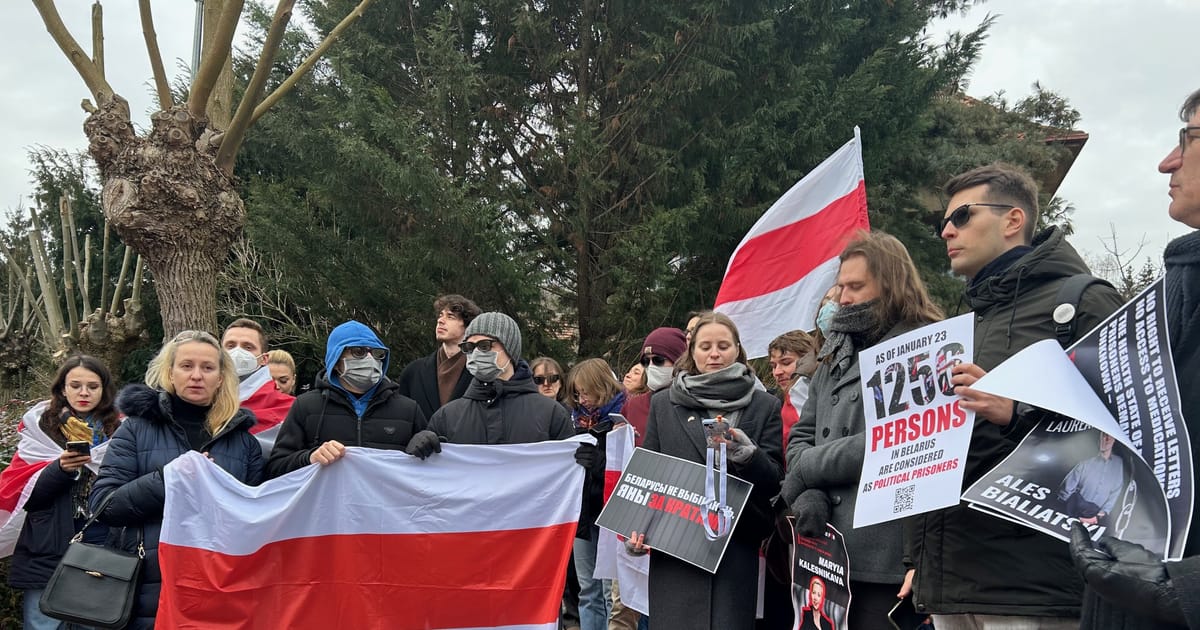Let’s start with just general numbers here. For those who might not know, do we presently have numbers on how many Belarusian refugees live in Czechia?
“We can’t call all Belarusians living here in Czechia refugees. Some of them are immigrants who emigrated from Belarus for studies, work, or family reunification. But in each case, there are some political aspects involved. For example, in the case of students, it’s because they can’t get a proper education in a free country—Belarus is not a free country. There are also restrictions in certain specializations in Belarus, or censorship, such as in the arts. That’s why they prefer to study here.
“As for refugees, after 2020, about 300 Belarusians who were affected by repression or became victims of police brutality escaped the country and moved to Czechia. The total number now is around 8,000, up from approximately 7,700 before.”
On Sunday, dozens of people gathered in front of the Belarusian embassy in Prague’s Troja district to protest against the repressive rule of President Alexander Lukashenko and the sham election. So what has been the response to Lukashenko’s sham election here, would you say? And maybe if you can comment domestically in Belarus as well.
“I think we should go back a little to the elections in 2020. When Svetlana Tikhanovskaya won here in Czechia and the Belarusian embassy under Lukashenko’s regime really counted the votes, I think it was the first time in the history of modern Belarus. And we know for sure that in our Belarusian community here, only 22 people voted for Lukashenko in 2020. So, the majority is against this regime. They’re against the police brutality we see in Belarus, and against the, let’s say, ‘unfree’ development of the country.
“On Sunday, some Belarusian students who represent the Association of Belarusian Students in Czechia decided to show their unwillingness to vote. They disagreed with the so-called elections, or I think it’s better to call them ‘special electoral operations,’ that took place in Belarus.
“They also invited those who came to Czechia, for example, in the 90s. If you look at the pictures from this event, from yesterday’s event, you can see people of different ages and generations. It’s not just young people. They were probably the ones who decided to show their protest, but other generations joined in as well. This reflects the general attitude in society toward this regime, which is not only authoritarian but also commits crimes. We should point out that this regime cannot be accepted as an official one and then be built upon.”
Building off of that, what is the place of the Belarusian opposition movement for democracy in Czechia? How strong is that movement in comparison to let’s say our neighboring nation Poland?
“In Czechia, we have the Office of Democratic Forces, which was set up in November 2022. To be precise, it was officially established on the 17th of November, which is the Day of the Fight for Freedom and Democracy here in Czechia. For us [Belarusians], our fight is still ongoing, which is why we chose this date. Officially, this office was inaugurated on the 25th of March 2024. It took some time to develop everything, but it was done at an official level. The inauguration was opened by Sviatlana Tsikhanouskaya, the president-elect of Belarus, the Minister of Foreign Affairs of Czechia Jan Lipavský, and many embassies, who joined us for the event.
“Now, this office is working to offer alternatives to the Belarusian society living here. Of course, we are limited in some actions, such as consular services, for example, but when people need help or legal advice on international protection or expired documents, we provide those services.”
Last question here is a joint question: would Belarusians living in Czechia be safe to return to Belarus presently? I imagine especially if they’re politically active that would be unlikely. And secondly, how safe do Belarusians feel now in Czechia? There’s a stigma against Russians; is there a similar stigma there with Belarusians?
“Well, I think this question has two aspects. Speaking about safety, it’s difficult to feel safe when there are FSB agents in many countries, and Czechia is no exception. But our Belarusian community is quite active and united, so I think we try to take care of this aspect. It doesn’t mean there are no threats, but the threats are not as high. For example, those who are somehow related to the FSB and still in Czechia have not been expelled from the country.
“As for the second aspect, if there’s any chance that people will go back to Belarus someday, I think it depends on the percentage of those who are willing to return and be useful to a new Belarus. This percentage is very high.
“Actually, we even try to compare our situation with that of people from Czechoslovakia who had to leave the country, and we found that the numbers in our case are higher. I believe that especially young students and young people, like those who organized yesterday’s gathering, still have the chance to use the knowledge they’ve gained here in a new Belarus. As for those who migrated in the 90s, the percentage might not be as high because they have already settled here. But there are some exceptions. For example, those who were politically active and represent the traditional Belarusian opposition—many of them will return when it is possible.”
The demonstration in Prague was organized by the Belarusian Students of the Czech Republic on the occasion of the Belarusian presidential elections on Sunday.
